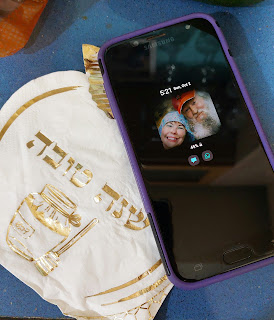7 Tishrei 5783, just days before Yom Kippur
I want to offer you a gift that may revolutionize your year. Last Rosh Hashanah, I took on the task each night of saying the following words before the bedtime Shema:
I hereby forgive anyone who angered me or annoyed me or provoked me or who sinned against me — whether against my body or my capital, or my dignity or anything that is mine, whether unintentionally or intentionally, whether erroneously or willfully, whether by speech or by action — and no person should be punished because of me, including me.*
This brief paragraph has changed my life, quite literally.
I don’t just say the words like so many rotely recited prayers. I really think, every night, about the people who made me just a little crazy during the day. The person who stopped at the top of the escalator to check her phone, unaware that walking is a team sport. The acquaintance who made a tasteless joke, thinking he was funny. The person who wrote a snarky response to an article I posted, rather than engaging in polite debate. The terrifyingly bad driver who cut off my kids in traffic and, save for wise driving decisions on their part, might have made my new grandson an orphan. And so on. Each of these “hurts” varied in intensity and importance. But every one of them was lifted from my mind and heart through these few words.
What about someone who has really, really wronged me? There have been a few. They take longer to forgive. Some people (like the crazy driver) have to be forgiven for a few nights running. Others, the really damaging ones, still need to be dealt with in a way that prevents me from having to carry them and the pain they caused forever. As the popular saying goes, why let someone who has hurt you live in your brain rent-free? I choose to believe that God wired us to want to be good. Those who are not are clearly cholim, ill people. Hating them hurts me. Davening for them to get well makes me feel free of their mental illness. It’s their problem, not mine. I can change my hurt feelings into feelings of pity and prayer. Very empowering.
Family, of course, benefits from this nightly exercise, as I don’t hold onto the kinds of grudges that can last for days or longer between loved ones. But it is worth it, especially where family and friends are concerned. First of all, as I mentioned, I’m not eating my kishkes out with anger. I think I’m nicer to people when I don’t hang onto anger or disappointment or hurt, justified or not.
Perhaps more importantly — If I drop off the twig suddenly, there’s no one I’ve forgotten to forgive. You can feel free to contact me if you need an apology from me; but you don’t need to worry about whether you are forgiven. I don’t have anyone to forgive in these days leading up to Yom Kippur, because I forgave you a long time ago.
And here’s a thought: What if everyone forgave everyone every night? What kind of world might we build‽
* A loose paraphrase of a translation (p. 461) in my favorite siddur, Nehalel beChol, by Michael Haruni
